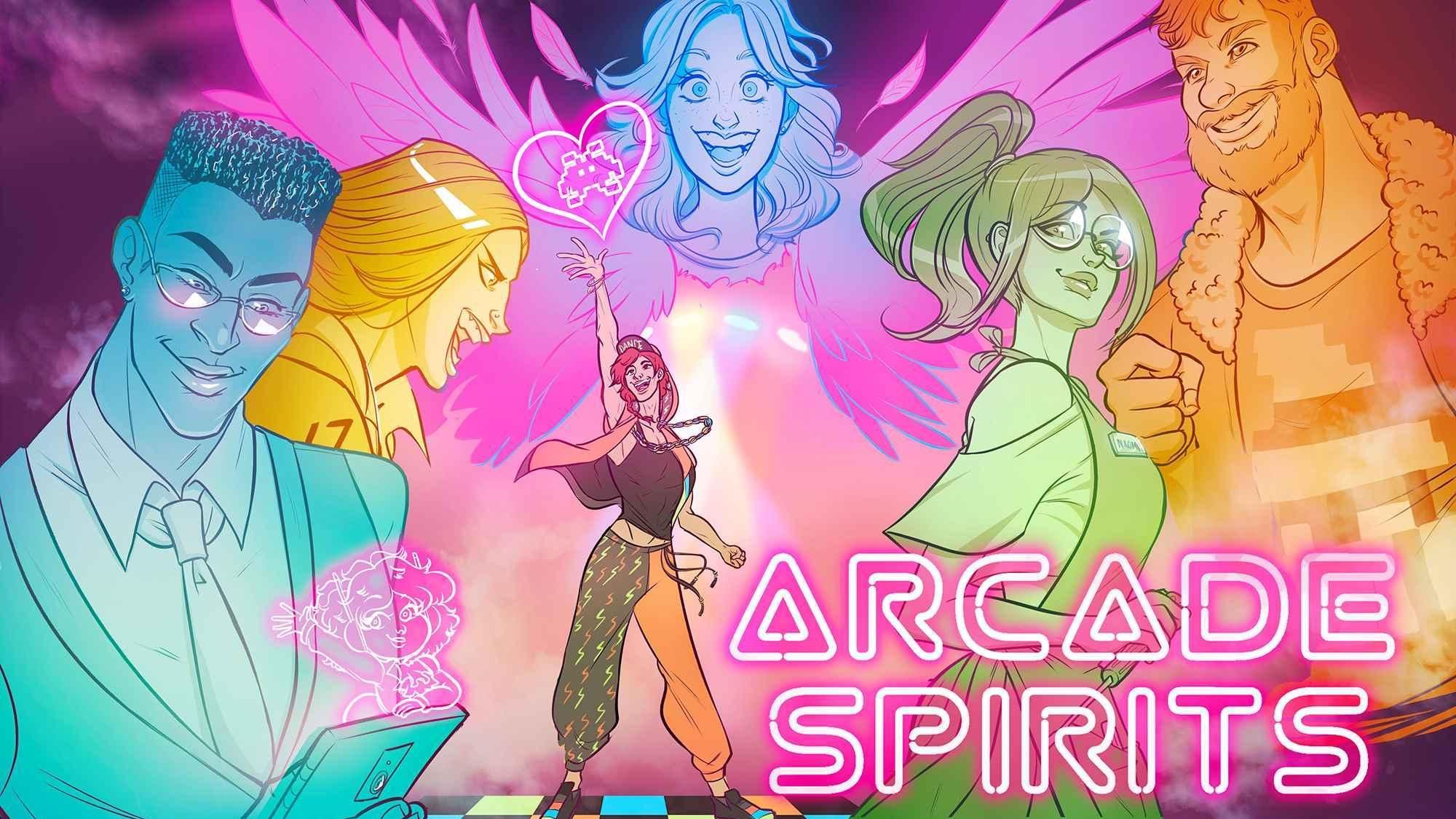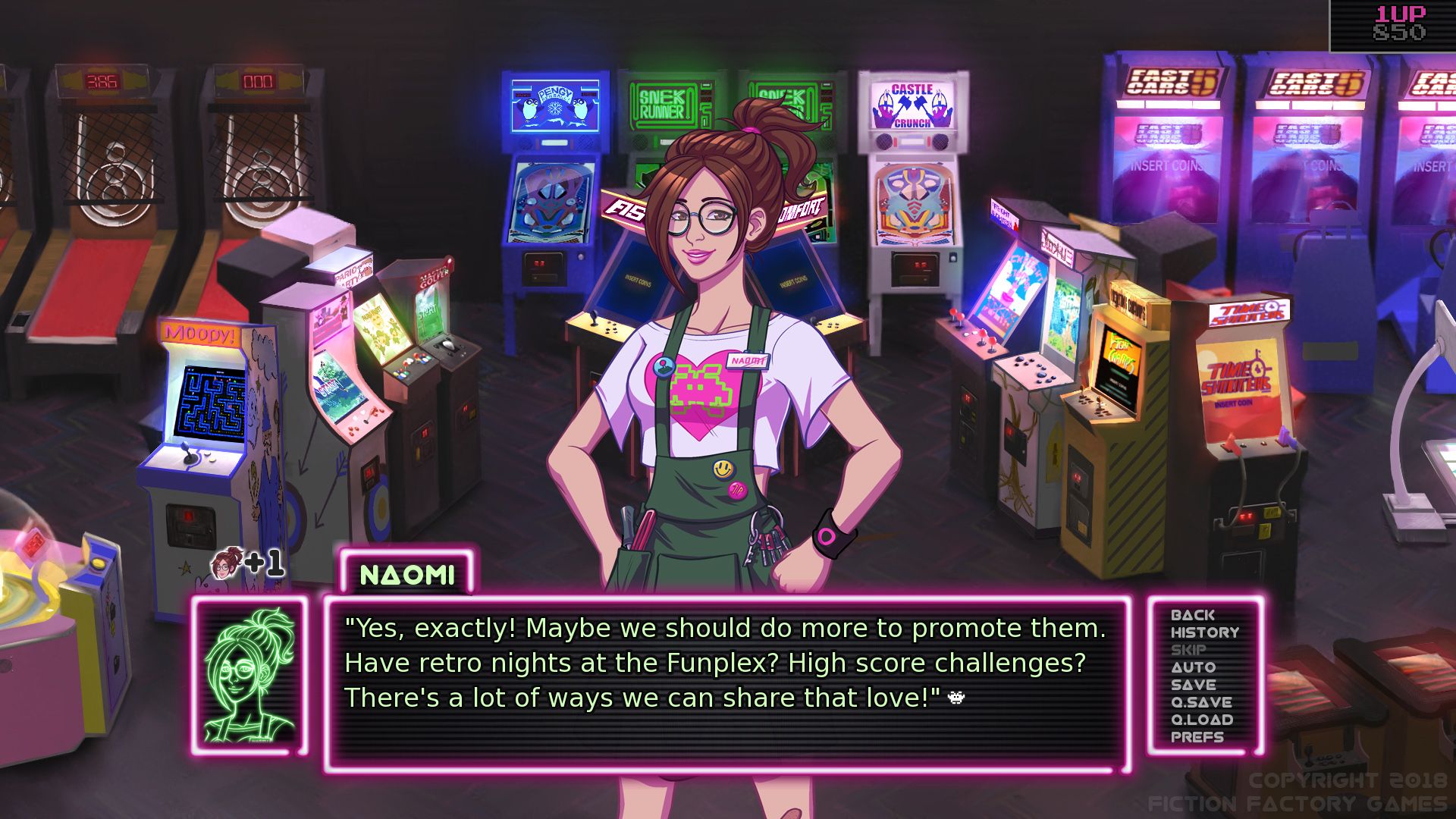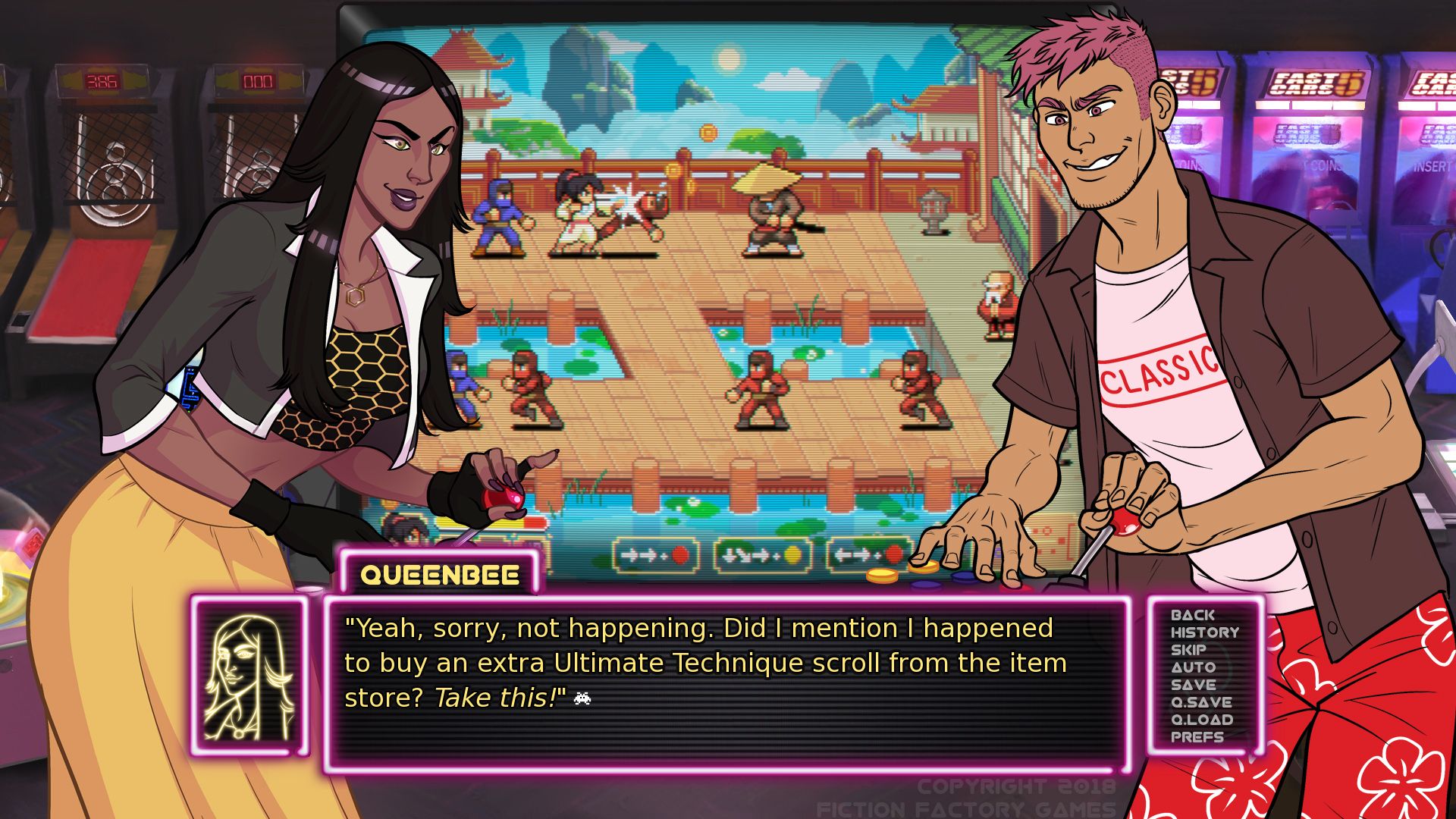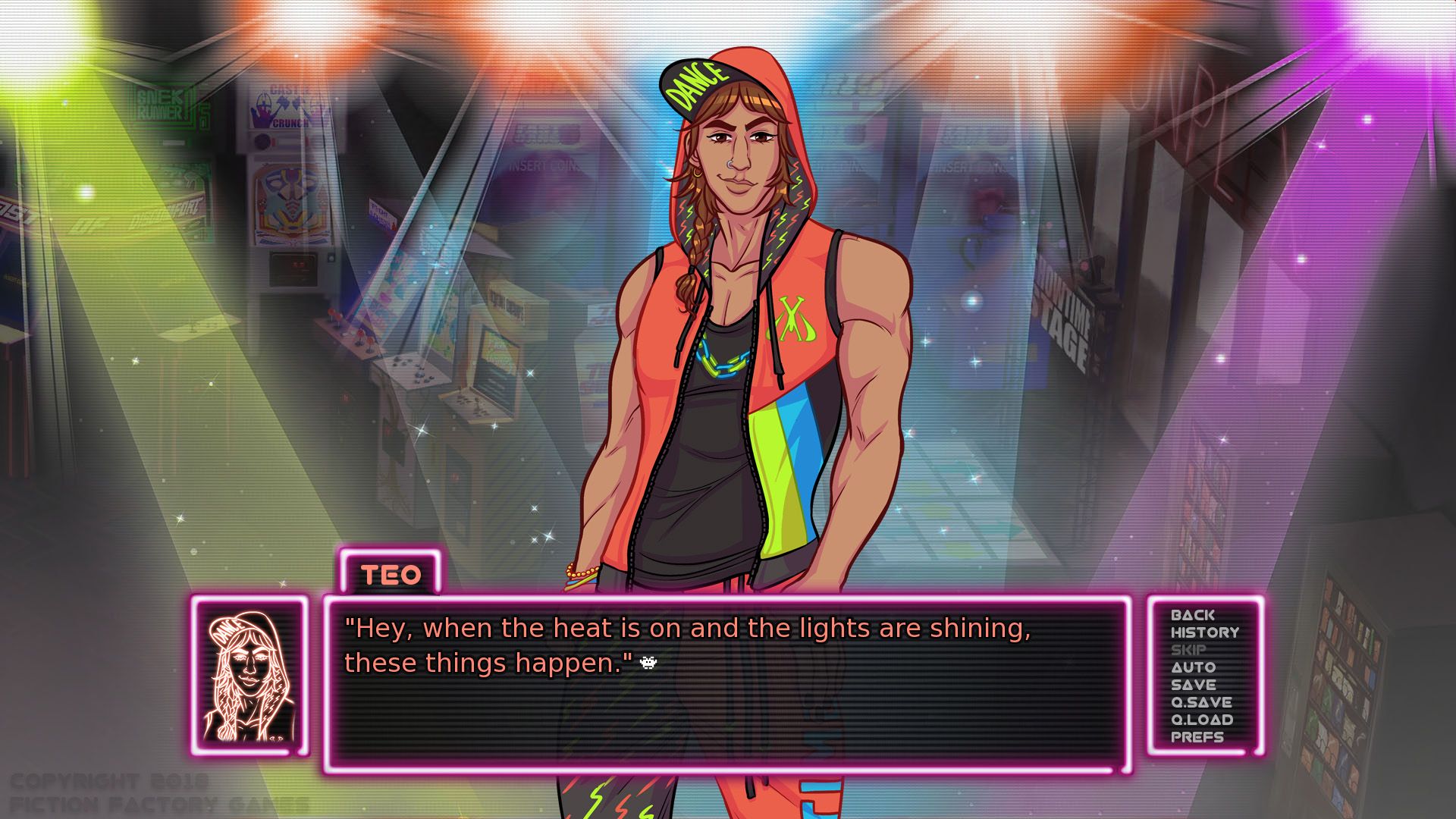Despite video games being a highly profitable industry at this point, there is still persistent and prevalent insecurity amongst gaming communities. To the mainstream, gaming still has many connotations and stereotypes that create a defensive and uptight attitude amongst the most fervorous so-called "gamers." Whether the gaming community at large deserves or even needs acceptance and approval from the rest of the society is a subject of opinion and debate—but in the world of Arcade Spirits, validation towards gaming is no longer an issue.
This visual novel comes from Fiction Factory Games, and having released on Steam early last year, Arcade Spirits is coming to Nintendo Switch, PS4, and Xbox One on May 1. It is essentially a romantic comedy by heart, but functionally, Arcade Spirits looks at the gaming industry outwardly through the lens of an alternate timeline. This is a world in which the 1983 video game crash never occurred, arcades continued to thrive, and in the present day, gaming is cool.
And as a romance-driven game, all of the gamers are hot, as a bonus.
Even before the current global pandemic, I've been in a long financial and mental health funk, which made the set-up for Arcade Spirits all the more relatable. The playable character, with name, appearance, and pronouns fully customizable, is in a similar loop of self-doubt and unemployment; the customization made it all the easier to imprint onto my character. Thanks to the player character's well-meaning graphic designer roommate, Juniper, and an uncomfortably invasive AI assistant named Iris, the Player lands a job as a floor attendant for a strip mall arcade called the Funplex, supposedly the Player's "dream job" based on an algorithm.
Here in the real world, I've had my fair share of arcade experiences—local centers in my area included places called Grand Slam USA and Arnold's Go-Karts, with the occasional childhood birthday party in a Chuck E. Cheese. My adult life would include pilgrimages to a few Round 1 locations, although I would begin to notice the lack of actual arcade cabinets in favor of mobile games blown up onto an HDTV. Besides a few visits to a Barcade or two, it felt like the time of vintage retro arcade games was long gone. The fictional Funplex, however, kept that retro spirit alive, holding reverence for old arcade machines, as inconvenient and dysfunctional as they may have been.
The main cast members of Arcade Spirits are either co-workers or regulars at the Funplex and their place among the arcade help to flesh out and project the very different attitudes towards video games in this alternate timeline. There's Naomi, the handywoman with an aptitude for repairing and maintaining arcade cabinets, the accountant Gavin, whose cold and methodical approach to business clashes with Naomi's reverence, and cosplayer and mascot Ashley. Frequent patrons include dancer Teo from the Showtime Stage scene, professional esports player for arcade title Fist of Discomfort, and score-chaser Percy, who is currently after the top score in Mr. Moopy's Magic Maze (all three aforementioned titles are fictional, of course). All of these characters represent very real people who one might as well meet in gaming circles, but all thrive to a greater degree in this entirely different landscape.
In Arcade Spirits, the notion that video games are child's play is nowhere to be seen; while children's birthday parties are still frequent in these venues, adults frequenting these arcades were not a stigma. Even casual arcade-goers were quite knowledgable of classic games, the same way one doesn't have to be a cinephile in the real world to have a general grasp of film history. Arcade critics would scout these venues, with their reviews being make-or-break. And esports players were mainstream celebrities—imagine numerous players having the popular reach of Ninja in our real world being the norm.
Even though home consoles and PC gaming still exist in the Arcade Spirits timeline, esports has more of a stronghold on the arcade floor. Streaming from arcades with webcams mounted to the cabinet were more commonplace, and esports players preferred the regular experience of playing with proper joysticks and buttons in close proximity, loud, trash-talking crowds. Indie games still exist but are prevalent through an indie arcade scene rather than digital marketplaces. It is a strange and delicate balance that the game plays, mixing references to real and current home console titles while also creating this alternate world, with characters expressing disdain for many of the elements of gaming that are familiar to use in real life.
What's more, the characters have intense respect for retro gaming history. Naomi, in particular, is fervent about game preservation and is often seen maintaining, fixing, and restoring old machines. It shouldn't be surprising that a villain emerges in the story in the form of a mustache-twirling magnate who wishes to do away with wooden cabinets, circuit boards, and CRTs in favor of touch screens, crane games, and "modernized" bastardization of classic IPs. In Arcade Spirits, gaming history is to be respected and protected. This attitude is exemplified in the character of Francine, the elderly owner and founder of the Funplex; she often speaks of being in the trenches of the industry in "198X" and "199X," making her a somewhat elder stateswoman of gaming, someone our world doesn't particularly have anyone analogous to. She is almost a gaming fairy godmother, guiding the Player to what they've been seeking all along—a calling, a purpose, a dream.
The theme of following your dream may come across as trite and schmaltzy, but the story of Arcade Spirits has its heart in the right place. I often think about the difference between "sentiment" and "sentimentality," the former represented by real feeling and the latter presented by telling the player or audience, depending on the medium, how they're supposed to feel. And perhaps it is my own personal struggles that led to this bias, but I felt real sentiment as I projected myself onto the Player character.
Finding one's true vocation and achieving personal gratification worked on both a thematic and gameplay perspective—based on dialogue choices and other decisions made in the game, players can work on some distinct traits: Quirky, Steady (sincere), Kindly (empathetic), Gusty (risk-taking), and Basically (neutral), and focusing on some traits over others will determine your character's relationships (romantic and otherwise) and overall attitude to the events of the game. It's all tracked by that invasive Iris AI, but even with all of her algorithms and prescience, emotional power is the ultimate driver of destiny.
Arcade Spirits crafts a fascinating "what if?" scenario, but I came out with the impression that the world of gaming is one of the most fitting settings for this story of finding one's calling. Whether you're in a world where arcades are mainstream or one where they are fading, the business may not be lucrative. Whether you're in a world where gaming is acceptable to the masses or one where it's a niche hobby, there can still be self-doubt if that is the path one wants to take in their career. In a landscape as everchanging as gaming, those through the thick of it must know that this is where they belong.
Perhaps the larger gaming world will never achieve this level of acceptance and validation—perhaps it doesn't deserve it. But if there is anything to learn from the topsy-turvy and radiant world of Arcade Spirits, it is that we must find that validation for ourselves. Only we as individuals can self-validate, finding and affirming whether where we are and what we do in life is what we truly want. Social stigma isn't what to listen to—instead, it's your own spirit.




